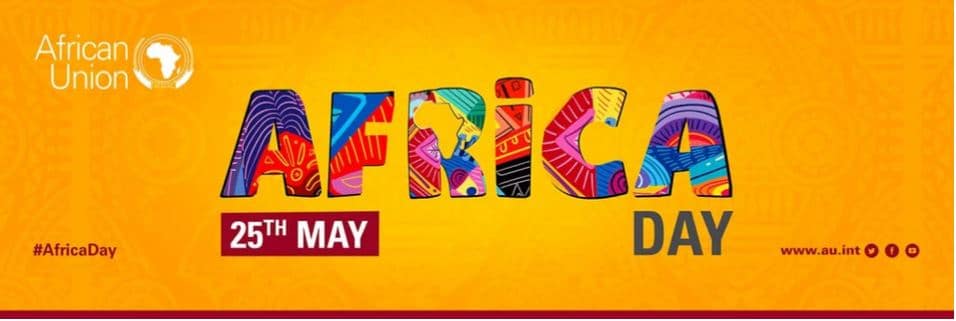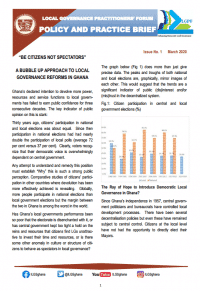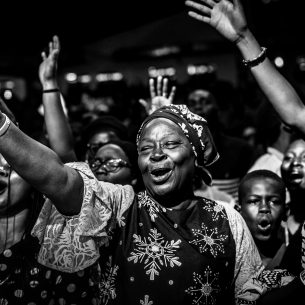
On 25th May each year, Africa Day is commemorated diversely in the continent and the diaspora. I would like to share some thoughts about what I believe must be an important day of reflection and re-commitment in our continent.
On 25th May 1963, the first African continental intergovernmental organization was created, following the independence of most countries. The Organization of African Unity (OAU), mother of the current African Union (AU), was born with the adoption of its Charter in Addis Ababa, Ethiopia, during a diplomatic conference hosted by the then Ethiopian Emperor Haile Selassie.
Africa Day should not be confused with African Union Day (AU Day), commemorated on the 9th of September each year, marking the day the Assembly of Heads of State decided to transform the OAU to the AU in Sirte, Libya on 9/9/99.
The OAU was founded by 32 countries. Later, 23 other nations have gradually joined the body over the years. OAU was an unprecedented commitment to Africa’s aspiration for the total political liberation of the continent from colonialism as well as the unity and solidarity among its people. While the main objectives of the OAU were to rid the continent of the remaining vestiges of colonization and apartheid and to promote unity and solidarity among African States, the new African Union aimed for “an integrated, prosperous and peaceful Africa, driven by its citizens and representing a dynamic force in the global arena.”
The transformation of the OAU to the AU created the hope of greater unity and solidarity of African countries and among African people. The desire to build a people-oriented and people-centered institution is the main distinguishing feature between the African Union and the former Organization of African Unity, which was exclusively state-focused. People called it the “Club of male Heads of State.”
Beyond the Celebration
First, it’s important that Africa Day is commemorated in all African countries and the entire diaspora. It should be a day on which we tell African stories to our young generations. The stories of our past glories, the stories of a future hope… Africa Day should also be a day of re-commitment to our Shared Values and our common Agendas, both the Agenda 2063 and the UN Sustainable Development Goals of which we are fully part. The AU has a set of Shared Values that centre around democracy and good governance, the rule of law and human rights, peace and security, and continental development and integration. Africa Day should be a day of a renewed African solidarity. A day of remembrance that an important part of our continent is still devastated by the ongoing unjustifiable conflicts, a day of determination to fight extreme poverty and all kind of inequalities and discriminations in Africa.
I still have memories of the Lomé Summit in 2000, when the new Constitutive Act of the AU was adopted. Managing the Civic Education Division of the National Radio of Togo, Radio Lomé, I broadcasted a radio show titled “from the OAU of Heads of State to the AU of Citizens” to my 2 million listeners. I can remember the excitement and the big hope of African citizens to be part of a new continental organization that aimed to pave the way to a stronger democracy, human security, prosperity, development.
Since its inception, the African Union has raised the normative bar for the socio-economic and democratic development ambitions of the continent. But the adoption of norms, treaties, policy frameworks is not enough to take us to the “Africa We Want” We must realize the promises by effectively implementing those instruments and regularly hold each other accountable to them. It is time to close the gap between continental promises and the daily reality of most citizens.
How is our Union Doing Today?
Are citizens genuinely given a chance to participate in the Union’s processes fully? Are we implementing fundamental principles that aim to secure a democratic Africa, the respect of human and people rights, and unlock potential for development? Are we managing our natural resources responsibly for the benefit of the continent and its people? How are we preparing our youthful population to take over? Are we harnessing our demographic dividend as promised in the related Roadmap? Are we abiding by our shared values? How consistant are the responses of the Peace and Security Council of the African Union to the issue of unconstitutional change of government or Coup d’Etat that is still happening in our continent?
Between 2014 and 2021, over 20,000 Africans have died or gone missing in the Mediterranean Sea trying to run away from our continent. Many others died in the Saharan desert before reaching the Sea. Why are they leaving the continents?
34 out of the 54 African Countries are labeled as “Least Developed Countries,” while at the same time billions of dollars are illegally taken out of the continent through illicit financial flows (IFF), according to the Thabo Mbeki Report.
Africa is said to possess over 90% of the world’s chrome resources, 85% of its platinum, 70% of its tantalite, 68% of its cobalt, 54% of its gold, plus significant oil and gas reserves. The continent is also home to uranium, manganese, diamonds, phosphate, and bauxite deposits in very high quantities. It has timber and other forest resources added to its vast arable land for agriculture.
We need to reflect on the many questions being asked by our people today: Have we really and genuinely moved from the OAU to the AU? Or are we still turning around with old practices? Why is 60% of the African Union budget still paid by external donors? What are the implications of such a fact on the integrity and effectiveness of our Union?
Ways Forward to the Africa We Want
We need to create a conducive environment for development to flow. The rule of law, democracy, and good governance ideals are critical to establishing peace and security in the continent. We promised to silence the guns in Africa by 2020, but we failed to do so and postponed the deadline to 2030. We are failing because we are doing the same things, using the same approach over and over again and excepting a different result.
Conflicts: Beyond Military Solutions: The AU itself has identified 21 current conflicts in the 55 countries that make up the Union. Root causes of most conflicts in Africa are to be found in extreme poverty, deep structural inequalities, discrimination, underdevelopment, unfair sharing of natural resources, political repression, mismanagement of our diversity, and climate change.
Military operations alone will not bring peace to Africa. We need to prioritize addressing governance crisis, promote inclusive dialogue, provide social services and boost development. Military interventions should only be at the service of this approach. Young people mostly used by warlords are vulnerable because they have nothing to lose.
During its special sessions, I have made submissions to the Peace and Security Council of the African Union on how we can silence the guns and make peace happen in the continent. Check it out here.

Prioritizing the Demographic Dividend: The age structure of our population has important impacts on our economic development. The “demographic dividend” refers to economic benefits arising from a significant increase of working-aged adults vis-a-vis those who are dependents. These working-aged adults must be healthy, educated, trained, skilled and, decent jobs and other economic opportunities should be created to meet their demand. Having a youthful population is not enough to catalyze development and prosperity. All African countries should effectively implement the AU Roadmap on harnessing the demographic dividend in Africa.
Stop the Outflow of Capital: Every year, $89 billion leaves the African continent as Illicit Financial Flows, according to a UNCTAD’s Economic Development in Africa Report. These are movements of money and assets across borders that are illegal in source, transfer, or use. It includes illicit capital getting out of the continent, tax and commercial practices like wrong invoicing of trade shipments, and criminal activities such as illegal markets, corruption, or theft. The shocking fact is that the billions lost annually to IFF are almost equal to the Official Development Assistance (ODA) and the Foreign Direct Investments (FDI) altogether. These are missed development opportunities. Tackling IFF requires international cooperation and actions both within the continent and outside.
Commissioned by the African Union and the United Nations Economic Commission for Africa, a High-Level Panel led by President Thabo Mbeki made practical recommendations to tackle the IFFs. We need to go back to those recommendations and implement them fully. If not, our journey to 2030 and 2063 will remain a dream.
Wishing you all a thoughtful Africa Day!
Nkosi Sikelel’ iAfrika!
God Bless Africa!






